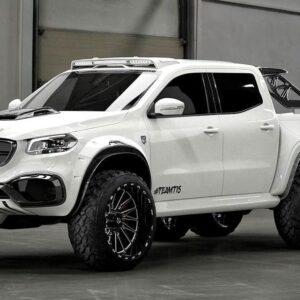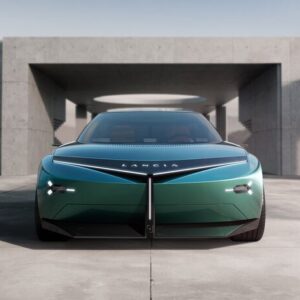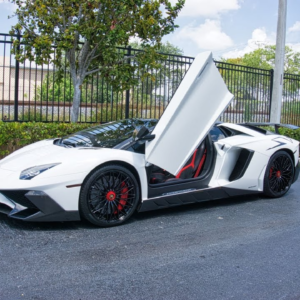From the September 2023 issue of Car and Driver.
Ask anyone who’s missing a few teeth or sporting some gnarly scars, and they’ll tell ya—life’s a lot more fun when you don’t take it too seriously. For proof, look to the three-wheeled Polaris Slingshot SLR. A few miles spent behind the visor of the Slingshot will have you ripping around traffic while blasting Inner Circle and might just be the final push needed to talk yourself into some tribal tattoos.

The $35,286 SLR we tested is the middle trim level, presumably between dude and brah. It’s about $10,000 more than the entry-level 178-hp Slingshot S and roughly $7000 less than the range-topping Roush Edition. Behind its grumpy plastic fascia sits Polaris’s own Prostar 203-hp 2.0-liter inline-four engine, and the SLR uses a wider (11.0-inch) rear wheel than base models. The 1661-pound SLR has nearly as much torque as a Mazda Miata, which is its closest automotive equivalent in terms of price and performance, but the Polaris revs to 8500 rpm, 1000 more than the Miata.
While you can get an automated manual transmission, our tester had as many pedals as it did tires. A five-speed manual strikes us as a little quaint, but its shifts felt slicker than what you get in many performance cars. Between shifts, you’ll find a powerband that delivers plenty of oomph above 6500 rpm. The blast to 60 mph is over in 5.3 seconds, two-tenths quicker than the last Slingshot we tested,which was propelled by a General Motors–supplied 173-hp 2.4-liter four. The updated 2.0-liter also beat the old 2.4-liter’s time to 100 mph by 2.7 seconds. Its quarter-mile outdid the previous Slingshot by half a second at 14.0 seconds and 101 mph.
HIGHS: 203 horsepower for 1661 pounds, has a manual, surfeit of ‘tude.LOWS: Priced like a car, helmet hair, rainy days.
We’re confident the SLR’s acceleration numbers would be more braggadocious with a grippier rear tire, but smoking the 305-section-width Kenda radial through second gear looks cooler than getting to 60 mph a half-second quicker. The 65.5/34.5 percent front/rear weight distribution also did the Slingshot no favors here. However, Polaris says if you stick with it, the Slingshot will reach 125 mph.
Around the 300-ft skidpad, the Slingshot held on with 0.90 g of stick, another improvement over the previous Slingshot that only managed 0.85 g. The Slingshot, down a wheel to the Miata, unsurprisingly exhibits less grip than a 2022 model we tested. That Mazda achieved 0.95 g while wearing 205/45R-17 Bridgestone Potenza S001 summer tires that were 20 mm narrower than the front tires on the SLR.

The Slingshot SLR’s stop from 70 took 157 feet—two feet shorter than the 2346-pound Miata and nine feet better than the previous Slingshot we tested. It has ABS, but the brake booster remains hydraulic, which makes for organic brake-pedal feel. The SLR uses 11.7-inch vented rotors clamped by single-piston calipers front and rear (R models get 13.3-inch vented fronts with four-piston Brembos).
Ahead of its lack of roof, doors, or second rear tire, the most entertaining part of driving the Slingshot SLR is hanging the tail out around corners. Even on completely dry pavement, you can send the Slingshot sliding, and a large part of the joy in that is the three-wheeler’s easily controlled action.

The SLR is a good time—it’s the on-pavement analogue to a high-strung Polaris side-by-side utility vehicle in the dirt. The optional heated and ventilated seats ($1559) are about as close as it gets to being a normal car. The air-conditioned seats at full tilt gloriously cooled our backs when we were mired in construction traffic under the heat of a glowing summer sun. Find the right playlist to pump through its Rockford Fosgate stereo, and don’t be surprised if, after a few days of ownership, you start styling your hair to better match the interior contours of a helmet.

Specifications
Specifications
2023 Polaris Slingshot SLR Vehicle Type: front-engine, rear-wheel-drive, 2-passenger, 0-door roadster
PRICE Base/As Tested: $32,097/$35,286
ENGINE DOHC 16-valve inline-4, aluminum block and head, port fuel injection Displacement: 122 in3, 1997 cm3 Power: 203 hp @ 8250 rpm Torque: 144 lb-ft @ 6500 rpm
TRANSMISSION 5-speed manual
CHASSIS Suspension, F/R: control arms/swingarm Brakes, F/R: 11.7-in vented disc/11.7-in vented disc Tires: Kenda Radial 225/45ZR-18 91W 305-30R-20 99V
DIMENSIONS Wheelbase: 105.0 in Length: 149.6 in Width: 77.9 in Height: 51.9 in Curb Weight: 1661 lb
C/D TEST RESULTS 60 mph: 5.3 sec 100 mph: 13.6 sec 1/4-Mile: 14.0 sec @ 101 mph 120 mph: 25.2 secResults above omit 1-ft rollout of 0.3 sec. Rolling Start, 5–60 mph: 5.4 sec Top Gear, 30–50 mph: 6.6 sec Top Gear, 50–70 mph: 7.3 sec Top Speed (mfr’s claim): 125 mph Braking, 70–0 mph: 157 ft Roadholding, 300-ft Skidpad: 0.90 g
C/D FUEL ECONOMY Observed: 22 mpg 75-mph Highway Driving: 29 mpg 75-mph Highway Range: 280 mi
C/D TESTING EXPLAINED

Austin Irwin
Associate Editor
Yes, he’s still working on the 1986 Nissan 300ZX Turbo project car he started in high school, and no, it’s not for sale yet. Austin Irwin was born and raised in Michigan, and, despite getting shelled by hockey pucks during a not-so-successful goaltending career through high school and college, still has all of his teeth. He loves cars from the 1980s and Bleu, his Great Pyrenees, and is an active member of the Buffalo Wild Wings community. When Austin isn’t working on his own cars, he’s likely on the side of the highway helping someone else fix theirs.





